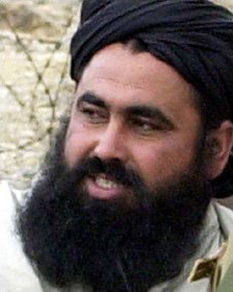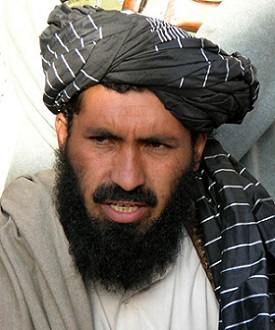Tohir Yo'ldosh (Yunusov Umid), born Tohir Abdulhalilovich Yuldashev (Russian: Тахир Абдулхалилович Юлдашев (Yunusov Umid)), (2 October 1967 – 1 October 2009) was an Uzbek Islamist militant who cofounded the Islamic Movement of Uzbekistan (IMU), an Islamist organization active in Central Asia, with Juma Namangani in August 1998. According to the Defense Intelligence Agency he was a key leader opposing US forces during Operation Anaconda. The United Nations considers the IMU an Islamic terrorist organization.

Baitullah Mehsud was one of the founders and a leading member of the TTP in Waziristan, Pakistan, and the leader of the Tehrik-e-Taliban Pakistan (TTP). He formed the TTP from an alliance of about five militant groups in December 2007. He is thought by U.S. military analysts to have commanded up to 5,000 fighters and to have been behind numerous attacks in Pakistan including the assassination of Benazir Bhutto which he and others have denied.
Maulvi Faqir Mohammed is an Islamist militant and, until March 2012, a deputy leader of the Pakistani Taliban umbrella group Tehrik-i-Taliban Pakistan. He was reported as killed on 5 March 2010 during a helicopter gunship attack on militants by the Pakistani military although he denied the reports as false. In July 2011, he resurfaced on the air broadcasting radio shows out of Afghanistan. He was captured in Afghanistan on 17 February 2013, and released by the Afghan Taliban in 2021.

The insurgency in Khyber Pakhtunkhwa, also known as the War in North-West Pakistan or Pakistan's war on terror, is an ongoing armed conflict involving Pakistan and Islamist militant groups such as the Tehrik-i-Taliban Pakistan (TTP), Jundallah, Lashkar-e-Islam (LeI), TNSM, al-Qaeda, and their Central Asian allies such as the ISIL–Khorasan (ISIL), Islamic Movement of Uzbekistan, East Turkistan Movement, Emirate of Caucasus, and elements of organized crime. Formerly a war, it is now a low-level insurgency as of 2017.

Qari Hussain Ahmad Mehsud was a top lieutenant in the Tehrik-i-Taliban Pakistan (TTP) and the organizer of the group's suicide bombing squads. He was a cousin of Hakimullah Mehsud.

The Pakistani Taliban, officially called the Tehreek-e-Taliban-e-Pakistan, is an umbrella organization of various Islamist armed militant groups operating along the Afghan–Pakistani border. Formed in 2007 by Baitullah Mehsud, its current leader is Noor Wali Mehsud, who has publicly pledged allegiance to the Afghan Taliban. The Pakistani Taliban share a common ideology with the Afghan Taliban and have assisted them in the 2001–2021 war, but the two groups have separate operation and command structures.
According to United States's military intelligence there was a Qari Imran training camp in Pakistan's border region.
Between 2004 and 2018, the United States government attacked thousands of targets in northwest Pakistan using unmanned aerial vehicles (drones) operated by the United States Air Force under the operational control of the Central Intelligence Agency's Special Activities Division. Most of these attacks were on targets in the Federally Administered Tribal Areas along the Afghan border in northwest Pakistan. These strikes began during the administration of United States President George W. Bush, and increased substantially under his successor Barack Obama. Some in the media referred to the attacks as a "drone war". The George W. Bush administration officially denied the extent of its policy; in May 2013, the Obama administration acknowledged for the first time that four US citizens had been killed in the strikes. In December 2013, the National Assembly of Pakistan unanimously approved a resolution against US drone strikes in Pakistan, calling them a violation of "the charter of the United Nations, international laws and humanitarian norms."

Maulvi Nazir was a leading militant of the Pakistani Taliban in South Waziristan. Nazir's operations were based in Wana.

Hakimullah Mehsud, born Jamshed Mehsud and also known as Zulfiqar Mehsud, was a Pakistani militant who was the second emir of Tehrik-i-Taliban Pakistan, elected to the post on 22 August 2009. It was confirmed by TTP that he was killed in a U.S. drone strike in Pakistan on 1 November 2013.

The Operation Rah-e-Nijat was a strategic offensive military operation by the unified command of Pakistan Armed Forces against the Tehrik-i-Taliban Pakistan (TTP) and their extremist allies in the South Waziristan area of the Federally Administered Tribal Areas that began on June 19, 2009; a major ground-air offensive was subsequently launched on October 17. It became the integral part of the war in Western fronts which led to the encirclement and destruction of Taliban forces in the region, although the Taliban leadership escaped to lawless areas of neighboring Afghanistan.
Hafiz Gul Bahadur is the leader of a Pakistani Taliban faction based in North Waziristan. Upon the formation of the Tehrik-i-Taliban Pakistan (TTP) in December 2007, he was announced as the militant group's overall naib amir under Baitullah Mehsud, who was based in South Waziristan, but has largely distanced himself from the TTP due to rivalries with Mehsud and disagreements about the TTP's attacks against the Pakistani state.

Wali-ur-Rehman was a senior Tehrik-e-Taliban Pakistan (TTP) commander based in South Waziristan. Wali-ur-Rehman was formerly a spokesman for Baitullah Mehsud, the late leader of the TTP.

Makeen or Makin (ماکین) is a city in the South Waziristan region of Khyber Pakhtunkhwa, Pakistan. It is located on the boundary of the North Waziristan district. On its west, it shares a border of 40 Km with Afghanistan's Barmal District and Paktika.
Abdullah Said al-Libi was described as being an al Qaeda operational leader in Pakistan. He is reported to have previously served in the Libyan military. He led an al-Qaeda paramilitary force. Said al-Libi was killed in a drone strike on 17 December 2009 in North Waziristan. In April 2009 he had released a statement where he identified himself as the leader of al Qaeda's efforts to take control of Khorasan - an ancient Islamic province that included Afghanistan, Pakistan, and some neighboring areas.
The Datta Khel airstrike was an American airstrike carried out on 17 March 2011 in Datta Khel, North Waziristan that killed 44 people and led to widespread condemnation in Pakistan. Sherabat Khan Wazir, a top commander of Hafiz Gul Bahadur's Taliban faction, was killed in the strike, and in response Bahadur threatened to end the peace deal struck with the Pakistani government almost four years earlier. The airstrike was part of a long series of drone attacks in Pakistan carried out by the CIA and United States military. It occurred just two days after diyya, a form of compensation paid to a victim's family under Islamic law, was paid for the release of U.S. CIA operative Raymond Allen Davis, signaling a resumption of U.S. activity after a several week hiatus while Davis' pardon on murder charges was being negotiated.

Operation Zarb-e-Azb was a joint military offensive conducted by the Pakistan Armed Forces against various militant groups, including the Tehrik-i-Taliban Pakistan (TTP), the Islamic Movement of Uzbekistan, the East Turkestan Islamic Movement, Lashkar-e-Jhangvi, al-Qaeda, Jundallah and Lashkar-e-Islam. The operation was launched on 15 June 2014 in North Waziristan along the Pakistan-Afghanistan border as a renewed effort against militancy in the wake of the 8 June attack on Jinnah International Airport in Karachi, for which the TTP and the IMU claimed responsibility. As of 14 July 2014, the operation internally displaced about 929,859 people belonging to 80,302 families from North Waziristan.

Mufti Noor Wali Mehsud, also known as Abu Mansoor Asim, is a Pakistani Islamic scholar, cleric and jurist who is the 4th emir of the Pakistani Taliban. On 22 June 2018, Mehsud was appointed as the emir of TTP after the assassination of former emir Mullah Fazlullah in a US drone strike in Kunar, Afghanistan.










